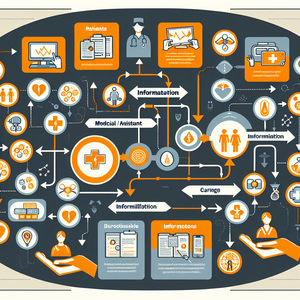
Discover Exciting Career Paths in Tissue Health and Wound Care: Insights and Opportunities
The healthcare industry is witnessing remarkable growth, particularly in specialized areas such as tissue health and wound care. This surge is driven by innovations in medical technology, a greater emphasis on effective wound management, and a rising demand for targeted healthcare solutions across different settings. Organizations like Tissue Health Plus are leading the way, offering a variety of roles that seamlessly combine clinical proficiency with technical acumen. From Wound Care Specialists who play a pivotal role in patient recovery to Sales Support Engineers who facilitate the distribution of cutting-edge solutions, the landscape of opportunities is expansive. The positions discussed in this article not only contribute significantly to patient healing and satisfaction but also highlight the essential collaboration between healthcare practitioners and technical professionals. As the field continues to evolve, the diversity of qualifications and responsibilities reflects the increasing specialization within this dynamic sector. For those seeking rewarding careers, this field presents numerous avenues to create a lasting impact.
Job Summaries:
Wound Care Specialist:
- Experts in skin and wound management
- Assess wounds
- Create treatment plans
- Empower patients through education
- Hold a Bachelor’s degree in Nursing
- Complemented by a specialized certification in wound care
- Play an essential role in promoting effective healing
- Enhance patient outcomes
Sales Support Engineer:
- This role involves providing technical guidance to sales teams and clients.
- Understanding customer needs.
- Conducting product demonstrations.
- Candidates typically have a background in engineering or a related field.
- Strong communication skills are essential.
- Bridging the gap between innovative products and client satisfaction.
Certified Medical Assistant:
- Supporting healthcare providers
- Perform clinical and administrative duties
- Taking patient histories
- Managing records
- Certification from an accredited medical assistant program is required
- Ensuring smooth operations within healthcare facilities.
Nurse Practitioner - Care Hub Lead:
- Leading patient care initiatives with a focus on wound management.
- These practitioners enhance health outcomes.
- They require a Master’s degree in Nursing and relevant certifications.
- Improving the quality of care through effective leadership and protocol development.
Quality Assurance Analyst:
- Responsible for ensuring that products and processes adhere to industry standards.
- Conducting audits.
- Implementing improvements.
- A background in healthcare management or a related field is essential.
- Strong analytical skills are essential for upholding high standards in patient safety and care.
Research Assistant:
- Assisting in clinical research
- Collect data
- Conduct experiments
- Support documentation efforts
- A Bachelor’s degree in a life science field is necessary
- Strong organizational skills are necessary
- Contributing to advancements in wound care practices and technologies
Clinical Supplies Coordinator:
- Managing medical supply inventories
- Ensuring that healthcare providers have the necessary resources
- A background in healthcare logistics or supply chain management is required
- Vital for the smooth functioning of healthcare operations
Health Informatics Specialist:
- Overseeing electronic health records systems
- Analyzing health data
- Improving data management processes
- A degree in health informatics or a related field is essential for enhancing the efficiency of patient care documentation.
Patient Care Technician:
- Assisting nursing staff with direct patient care
- Monitoring vital signs
- Ensuring patient comfort
- A high school diploma and nursing assistant certification are required
- Crucial for providing compassionate care
Marketing Specialist:
- Developing and executing marketing strategies for healthcare services and products.
- A degree in marketing or communications is necessary.
- Strong analytical skills are necessary for raising awareness of wound care solutions.
Healthcare Compliance Officer:
- Ensuring compliance with regulatory requirements and ethical standards through audits and staff training.
- A degree in healthcare administration or law, plus compliance certification, is essential for safeguarding the integrity of healthcare practices.
Biomedical Engineer:
- Designing and enhancing medical devices related to wound care while collaborating with clinical teams.
- A degree in biomedical engineering is required, driving advancements in medical technology within healthcare settings.
Dietitian/Nutritionist:
- Crafting dietary plans that support wound healing
- Assessing nutritional needs
- Educating patients
- A degree in nutrition and registered dietitian certification are necessary for facilitating optimal recovery through nutrition.
Occupational Therapist:
- Assisting patients in regaining daily living skills post-wound or surgery.
- A Master’s degree in occupational therapy and relevant licensure are required.
- Enhancing patient independence and quality of life.
Clinical Trial Coordinator:
- Managing the logistics of clinical research studies related to wound care products.
- A degree in health sciences or a related field is essential for ensuring patient safety and compliance in research environments.
Surgical Technologist:
- Supporting surgical procedures by preparing instruments and maintaining a sterile environment.
- Certification in surgical technology is required, contributing to safe and effective surgical interventions.
Clinical Education Specialist:
- Creating and delivering educational programs for healthcare providers on best practices in wound care.
- A clinical background and experience in education are preferred.
- Elevating the knowledge and skills of healthcare teams.
Physician Assistant:
- Collaborating with physicians to assess and treat complex wounds.
- Conducting examinations.
- Developing treatment plans.
- A Master’s degree from an accredited PA program is required.
- Licensure is required for providing high-quality care that enhances patient outcomes.
Phlebotomist:
- Drawing blood samples for lab tests while ensuring patient comfort.
- Certification in phlebotomy is necessary, being essential for accurate diagnosis and treatment planning.
Health Coach:
- Encouraging healthy lifestyle choices that facilitate wound healing and overall wellness.
- A background in health education or counseling is preferred, significantly contributing to patient engagement and recovery.
The demand for specialized roles in healthcare is on the rise, and the field of tissue health and wound care offers a wealth of opportunities for professionals across various educational and experiential backgrounds. By grasping the qualifications, responsibilities, and impacts of each role, prospective candidates can effectively navigate their career paths within this vital sector. For those interested in embarking on a fulfilling career in this dynamic field, regularly updated job listings are available on the Tissue Health Plus careers page.
Explore More Jobs

